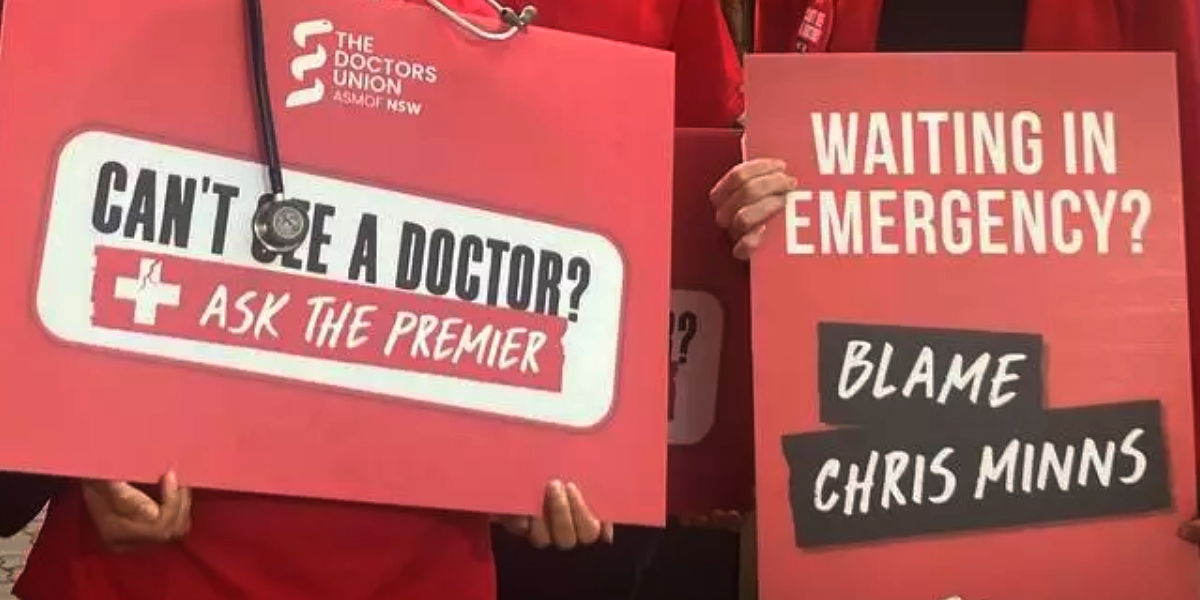Thousands of doctors across New South Wales will begin a three-day strike from tomorrow, as frustration over doctor shortages and unsafe working hours in the public health system reaches a tipping point.
The industrial action, led by the Australian Salaried Medical Officers’ Federation (ASMOF) NSW, will see public hospital staffing reduced to public holiday levels from Tuesday to Thursday this week. Doctors are protesting chronic understaffing, extreme fatigue, and the State Government’s refusal to address what they describe as a system on the brink of collapse. It follows similar industrial action and mass resignation by psychologists over similar issues with unsafe conditions, understaffing, and pay.
ASMOF President Dr Nicholas Spooner said the decision to strike was not taken lightly but claimed the Minns Government had left doctors no choice after abandoning negotiations on critical workplace reforms.
“Patients are struggling to see a doctor in NSW public hospitals. That’s because doctors are exhausted, burnt out and leaving the public sector,” Dr Spooner said.
“We are working dangerously long hours, including 16-hour back-to-back shifts with barely any rest, and often covering multiple roles due to chronic staff shortages.
“These conditions are unsafe for doctors and unsafe for patients. We’ve been negotiating in good faith for months, but the Government is still refusing to fix this crisis.
“Striking is a last resort for us, and we are doing this so the Premier might finally listen and act.”
During the strike, hospitals across the state will operate under ‘skeleton’ staffing, similar to public holiday arrangements. While emergency and critical care services will remain operational and safely staffed, non-urgent care will be significantly affected.
As many facilities and services in the New England are already chronically understaffed, it is likely that there will be minimal difference locally, but very significant differences if transport or telehealth with specialist care is required.
Elective surgeries, outpatient clinics and non-urgent medical procedures will be postponed or cancelled.
“We want to be very clear with the people of NSW. Patient safety will not be compromised,” Dr Spooner said.
“If you or your family need urgent medical care at any hospital across NSW, our doctors and medical staff will be there to provide it. Emergency departments and critical care units will remain safely staffed.”
Dr Spooner also warned that doctors are leaving NSW in increasing numbers, seeking better conditions in other states.
“With the threat of industrial action looming, instead of making a genuine offer, we have received the same offer the government made in June last year – a 3% pay raise. That will not assist in attracting and retaining the skilled staff specialists we need in NSW.”
He said safe working hours and minimum 10-hour breaks between shifts are urgently needed to prevent dangerous levels of fatigue.
“It’s demoralising and heartbreaking to work in a system that is breaking down in real time in front of us,” he said.
NSW Health Minister Ryan Park condemned the strike, noting it defied an order from the Industrial Relations Commission (IRC).
“ASMOF’s strike plans will disrupt our hospitals and health facilities across NSW – both to emergency departments as well as planned surgeries – contrary to the union’s claims patient care will not be impacted,” Minister Park said.
“Preparations are now urgently underway to manage impact on our patients. Patients with surgeries postponed will be contacted.”
He urged people to use HealthDirect for non-urgent care and call Triple Zero for emergencies.
Minister Park claimed the government has offered a 10.5 per cent multi-year wage increase, on top of the 4.5 per cent already granted, and criticised ASMOF for refusing to resolve its claims through the IRC.
“I say to ASMOF, it is not too late to return to the IRC,” he said.
The outcome of this week’s strike could have lasting implications for the future of the state’s health system and its ability to retain and support medical professionals.
Don’t miss any of the important stories from around the region. Subscribe to our email list.


